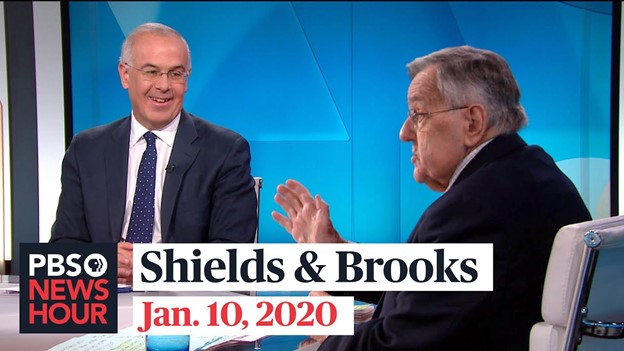
Last month, the PBS News Hour said goodbye to Mark Shields and honored his decades of work with a praise-filled tribute. Shields was a political commentator, but don’t worry – this isn’t about politics. It’s about character. It’s about how to interact with people in a way that consistently adds to the marble jar.
I should also clarify that this piece isn’t me telling you to be more like Mark Shields. It’s really an extended note to myself to more like Mark Shields.
In the video tribute PBS made for him, Shields’s coworkers spoke of his authenticity and his humility, saying things like, “It was heaven” to work with him, “He is a man of deep character and integrity,” and “I’m not sure in the past 30 years that I’ve met a more gracious, kind person to work with.”1
Wow.
I mean, I think my coworkers like me, but they’re not going to say that when I leave.
My own assessment from watching Mark Shields over the past two years is that he is well-informed but not presumptuous. He is gracious but not spineless. He knows where he stands but is not inflexible. He admits when he is wrong. And he’s not in it for fame, fortune, or power. His goals are to understand and to inform.
His colleagues delivered what amounted to a living eulogy, expressing gratitude for a life well-lived to someone who is, thankfully, still alive to hear it. Their praise for Shields highlighted for me what really matters most. I found the send-off they gave him inspiring. And upon self-reflection, I found myself to be wanting.
I’ve devoted a lot of time and energy to developing a better resume, but how much effort have I put toward earning a better eulogy?2 What do I want my coworkers to say about me when I retire? What do I want my friends and family to say about me at my funeral?3
The practicing Stoic in me understands that I am mortal and that now is the time to live in line with my values. Now is the time to live with virtue, as Mark Shields has.
Toward a Better Discourse
While I’m not here to talk about politics, we should note that it’s doubly impressive that Shields maintained this kind of character while serving as a political commentator, even as bitter hostility increasingly became the standard tone through which politics is discussed.
His role as a talking head was to be the center-left counterpart to the center-right commentator David Brooks. I’ve often made of point of watching those two analyze the week’s news on Friday because it’s genuinely refreshing to hear people with different perspectives discuss the issues in a calm and congenial manner.
Brooks penned his own tribute for Shields, in which he offered the following glowing praise:
“We’ve had thousands of disagreements over the years, but never a second of acrimony. Mark radiates a generosity of spirit that improves all who come within his light.”2
“After decades in journalism, Mark still puts the character lens before the partisan lens. He has been quick to criticize Democrats when they are snobbish, dishonest or fail to live up to the standards of basic decency — often infuriating some of our viewers.”2
“He comes from a generation that highly prized egalitarian manners: I’m no better than anyone else and nobody is better than me. … As everybody at the ‘NewsHour’ can attest, he treats everybody with equal kindness.”2
Their example is hopeful. Shields and Brooks behave the way our leaders should behave. But I’m not talking about the particular political beliefs they have or their stances on the issues. I’m talking about the way they engage with politics.
They approach “the other side” not as a collection of evil or ignorant enemies, but as a group of human beings who are trying to help other human beings. And their goal is to understand, to be understood, and work toward a win-win compromise. And the fact that what I just said sounds radical speaks volumes about the poor health of our national discourse.
But again, this isn’t really about politics. The Shields and Brooks model applies to how we interact in our homes and workplaces, how we talk to our friends and neighbors, how we deal with store clerks and customer service representatives.
We can disagree without being disagreeable. We can debate without arguing. We can fail to see eye to eye but still look the other person in the eyes with warmth.
These things are hard to do. Personally, I struggle mightily. But Mark Shields showed us they are possible. And I’ve resolved to try my best to live up to his example.
1 “Honoring Mark Shields and his decades of political analysis.” PBS NewsHour. Dec 18, 2020.
2 Brooks, David. The Road to Character. Random House, 2015.
3 Covey, Stephen R. The 7 Habits of Highly Effective People. Free Press, 2004.
4 Brooks, David. “Mark Shields and the Best of American Liberalism.” The New York Times. Dec. 17, 2020.
